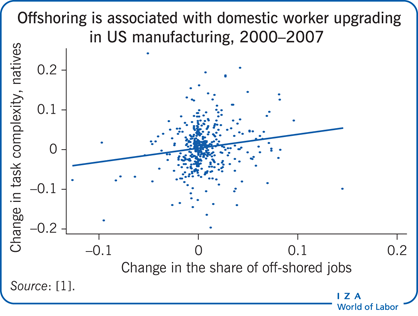Elevator pitch
The impact of offshoring on domestic jobs is more complicated than it first appears. In the standard narrative, offshoring production is thought to harm domestic workers by providing cheap alternative sources of labor. However, while offshoring may directly displace domestic workers, the resulting foreign market access and lower production costs allow domestic firms to increase efficiency, expand production, and thus create new jobs for domestic workers. These new jobs often involve more complex tasks, as revealed by the positive relation between the share of offshored jobs and the average cognitive and interactive task content of domestic jobs.
Key findings
Pros
Offshoring gives domestic firms access to foreign markets and reduces production costs.
Foreign market access and lower production costs allow domestic firms to increase efficiency, expand production, and thus create new jobs for domestic workers.
As offshored jobs are typically less intensive in communication and cognitive skills than tasks that remain domestic, offshoring leads to task upgrading for domestic workers.
The net employment effect of offshoring for domestic workers is limited.
Cons
Job creation abroad through offshoring may come with job destruction at home.
For offshoring to have a positive effect on domestic employment, the efficiency gains it generates must be large enough to adequately boost the overall number of jobs.
Whether the increase in the overall number of jobs is large enough remains inconclusive because of data limitation.
Task upgrading requires domestic workers to have or to develop the higher skills needed, which may cause job and wage polarization among domestic workers.
